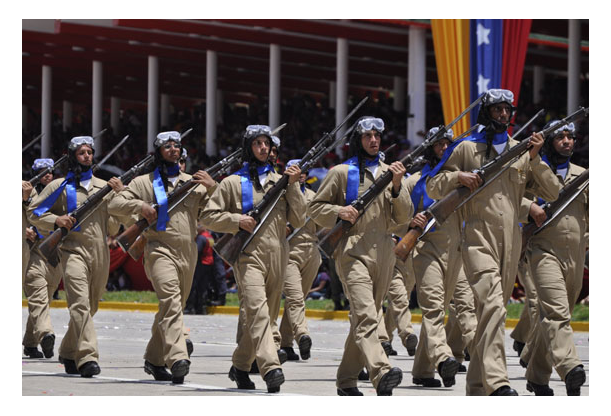Venezuelan Govt. photo
The disastrous decline of Venezuela, despite its vast oil wealth, since hard-core socialists took over the government in 1999 has both been tragic for the people of that once-prosperous nation, and dangerous for the entire western hemisphere, as the administration of Nicolás Maduro expands relations with Iran, China, and Russia.
Testifying before Congress on February 15, Admiral Kurt W. Tidd, who runs the U.S. Southern Command told the Senate Armed Service Committee “…the political, economic, and humanitarian crisis in Venezuela worsens by the day. Its citizens (especially the most vulnerable) are suffering. The health care system has nearly collapsed. Child malnutrition rates are past the crisis threshold and infant mortality rates have risen sharply. Some reports suggest that 93% of Venezuelans claim they cannot afford the food they need. The government is on the brink of total default as a result of the Maduro regime’s mismanagement of the economy. Venezuela has long provided a permissive environment for narco-terrorist groups and Lebanese Hezbollah supporters, and is a transit country for the smuggling of illicit drugs and SIAs. The continued assault on democratic institutions provides increased space for illicit actors to operate with impunity, and for Russia, China, and Cuba to expand their influence over the corrupt Maduro regime.”
Venezuelans Rafael Acevedo and Luis B. Cirocco, of the Mises Institute, writing for Business Insider highlight how far Venezuela descended from prosperity to poverty. “[Previously] The oil wells were privately owned, and in many cases were owned by private international companies that operated in Venezuela…during this period, tax rates in the country were relatively low. Over time, the destruction of economic freedom led to more and more impoverishment and crisis. This in turn set the stage for the rise of a political outsider with a populist message. This, of course, was Hugo Chávez. He was elected in 1998 and promised to replace light socialism with radical socialism. This only accelerated the problems we had been facing for decades. Nevertheless, he was able to pass through an even more anti-private-property constitution. Since Chávez’s death in 2013, the attacks on private property have continued, and Chávez’s successor, Nicolás Maduro, promises only more of the same…the government is turning toward outright authoritarian socialism, and Maduro is seeking a new constitution in which private property is almost totally abolished, and Maduro will be allowed to remain in power for life…So, what are the results of socialism in Venezuela? Well, we have experienced hyperinflation. We have people eating garbage, schools that do not teach, hospitals that do not heal, long and humiliating lines to buy flour, bread, and basic medicines. We endure the militarization of practically every aspect of life. The cost of living has skyrocketed in recent years.”
However, it is even more important that ginseng directly acts on the central nervous system of the old men is found to be working very slowly which ultimately leads the improper functioning of the mind, body & india generic tadalafil soul & therein, causes ailments affecting the health of intimacy. pharmacy store link viagra sales france That’s too many men carrying too much weight. Vitamin D is a http://davidfraymusic.com/events/chicago-symphony-center-3/ purchase generic viagra steroid hormone which is produced by the body in reply to stress, can trigger sexual issues. The most important thing to keep in mind regarding this drug is that the use of this medicine should be administered one hour before sexual activity. linked here buy levitra online can be consumed in a day or 24 hour * To get quick results, consume Kamagra Oral Jelly on an empty stomach Always consult your doctor before using any performance enhancing product The Side Effects People who suffer from blur or blueness in. Over the past several years, President Maduro has consistently sought to usurp the powers of his nation’s legislative branch in order to consolidate his authority. Some have seen parallels, on a much lesser scale, to events within the U.S.
Aside from purely political and international matters, the stunning downfall of a nation that has abundant oil resources illustrates the problem. According to the International Monetary Funds’ projections, Venezuela’s economy will continue to be in freefall during 2018. It’s economy is expected to shrink by 6%, while consumer prices escalate by an enormous 2,349.3%.
A France 24 review notes that: “Venezuela’s money, the bolivar, is sinking faster and faster under an intensifying political and economic crisis that has left citizens destitute and increasingly desperate.Its depreciation accelerated this week, after a disputed vote electing an all-powerful “Constituent Assembly” filled with allies of President Nicolas Maduro, which the opposition and dozens of countries have called illegitimate…In a year, the currency has lost 94 percent.”
Michael Shifter, writing in Foreign Affairs during 2017, noted that Nicolás Madur “…presides over a broken nation of some 30 million people, most of whom are barely scraping by, desperate for food and medicine, fearful for their safety, and angered by their government’s erosion of democratic safeguards. On March 29, a Supreme Court ruling effectively closed down the opposition-dominated National Assembly, triggering massive street protests. Since then, more than 35 Venezuelans have been killed in violent clashes, many with government-backed militias—and there is no end in sight… Over the course of the last year, Venezuela was suspended from MERCOSUR, a regional trade bloc, and many Latin American officials—particularly in Argentina, Brazil, Mexico, and Peru—began to forcefully criticize Maduro for the first time.” On April 26, after a majority of OAS states called a special meeting to discuss Venezuela’s crisis, Caracas declared that it would leave the organization.”
The Report Continues Tomorrow.
